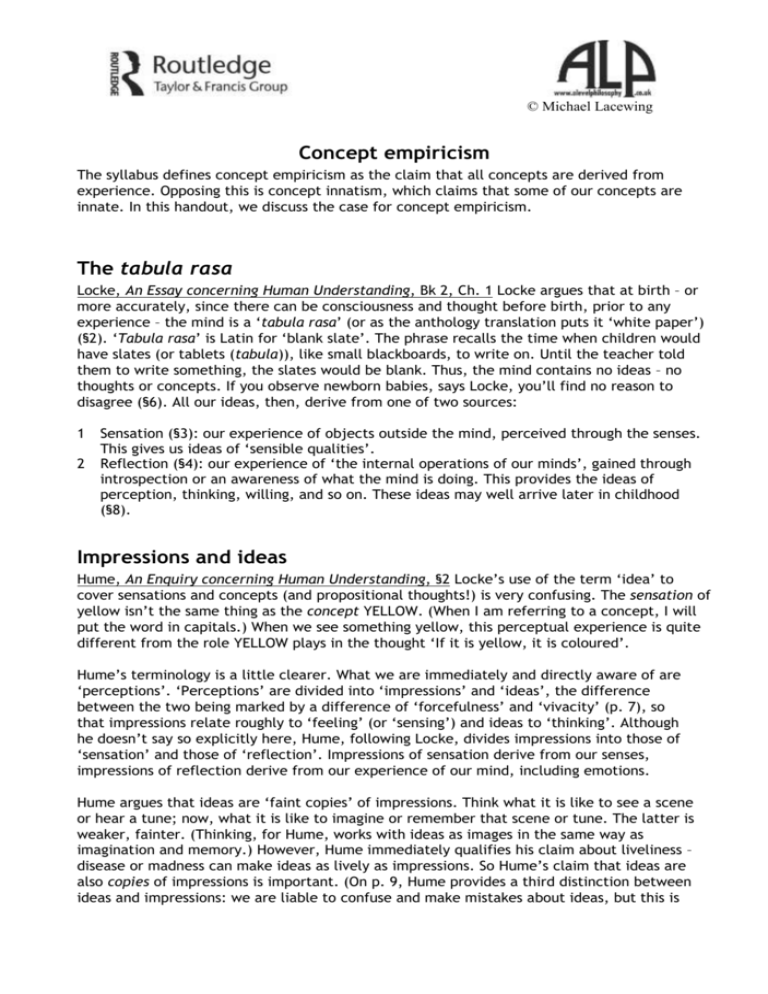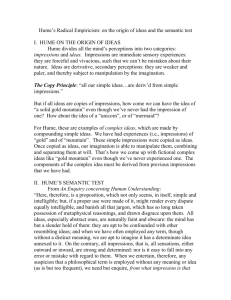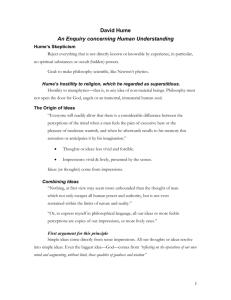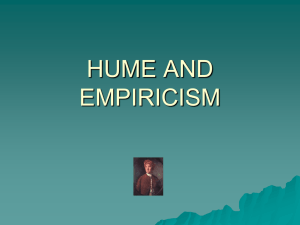Microsoft Word - Concept empiricismx
advertisement

© Michael Lacewing Concept empiricism The syllabus defines concept empiricism as the claim that all concepts are derived from experience. Opposing this is concept innatism, which claims that some of our concepts are innate. In this handout, we discuss the case for concept empiricism. The tabula rasa Locke, An Essay concerning Human Understanding, Bk 2, Ch. 1 Locke argues that at birth – or more accurately, since there can be consciousness and thought before birth, prior to any experience – the mind is a ‘tabula rasa’ (or as the anthology translation puts it ‘white paper’) (§2). ‘Tabula rasa’ is Latin for ‘blank slate’. The phrase recalls the time when children would have slates (or tablets (tabula)), like small blackboards, to write on. Until the teacher told them to write something, the slates would be blank. Thus, the mind contains no ideas – no thoughts or concepts. If you observe newborn babies, says Locke, you’ll find no reason to disagree (§6). All our ideas, then, derive from one of two sources: 1 2 Sensation (§3): our experience of objects outside the mind, perceived through the senses. This gives us ideas of ‘sensible qualities’. Reflection (§4): our experience of ‘the internal operations of our minds’, gained through introspection or an awareness of what the mind is doing. This provides the ideas of perception, thinking, willing, and so on. These ideas may well arrive later in childhood (§8). Impressions and ideas Hume, An Enquiry concerning Human Understanding, §2 Locke’s use of the term ‘idea’ to cover sensations and concepts (and propositional thoughts!) is very confusing. The sensation of yellow isn’t the same thing as the concept YELLOW. (When I am referring to a concept, I will put the word in capitals.) When we see something yellow, this perceptual experience is quite different from the role YELLOW plays in the thought ‘If it is yellow, it is coloured’. Hume’s terminology is a little clearer. What we are immediately and directly aware of are ‘perceptions’. ‘Perceptions’ are divided into ‘impressions’ and ‘ideas’, the difference between the two being marked by a difference of ‘forcefulness’ and ‘vivacity’ (p. 7), so that impressions relate roughly to ‘feeling’ (or ‘sensing’) and ideas to ‘thinking’. Although he doesn’t say so explicitly here, Hume, following Locke, divides impressions into those of ‘sensation’ and those of ‘reflection’. Impressions of sensation derive from our senses, impressions of reflection derive from our experience of our mind, including emotions. Hume argues that ideas are ‘faint copies’ of impressions. Think what it is like to see a scene or hear a tune; now, what it is like to imagine or remember that scene or tune. The latter is weaker, fainter. (Thinking, for Hume, works with ideas as images in the same way as imagination and memory.) However, Hume immediately qualifies his claim about liveliness – disease or madness can make ideas as lively as impressions. So Hume’s claim that ideas are also copies of impressions is important. (On p. 9, Hume provides a third distinction between ideas and impressions: we are liable to confuse and make mistakes about ideas, but this is more difficult with impressions.) So just as there are impressions of sensation and reflection, so there are ideas of sensation (e.g. RED) and ideas of reflection (e.g. THINKING). What Hume means by ‘idea’ here, we can refer to as concepts. So his theory of how we acquire ideas, namely by copying them from impressions, is a theory of how we acquire concepts. So Locke and Hume have slightly different versions of how we first acquire ideas with which we can think. We start with sense experiences of the physical world and experiences of our own minds; for Locke, this gives us ideas; but this makes it sound as if the experiences themselves are the ideas with which we think. Hume corrects this: it is copies of sensory impressions that we use in thinking. Why think that all ideas derive from impressions? Hume gives two arguments (p. 8). The first relates to ‘simple’ and ‘complex’ ideas – we’ll return to this below. The second is that without having a particular type of experience, a person lacks the ability to form an idea of that experience. Thus, a blind man does not know what colour is and a mild man cannot comprehend the motive of revenge. The missing shade of blue However, Hume notes that there is an exception to his principle that all simple ideas are copies of impressions. If you present someone with a spectrum of shades of blue with one shade missing, then using their imagination, they will be able to form an idea of that shade. This idea has not been copied from an impression. Hume dismisses the example as unimportant, but it is not. If it is possible that we can form an idea of a shade of blue without deriving it from an impression, is it possible that we could form other ideas without preceding impressions? The question is important because Hume uses his ‘copy principle’ repeatedly in his philosophy. He closes §2 (p. 10) by saying that in metaphysics, we become confused because the ideas we work with, e.g. SUBSTANCE, are ‘faint and obscure’, so we don’t understand them well. But if ideas derive from impressions, we can solve metaphysical debates by asking, of the words used, ‘From what impression is that supposed idea derived?’ If we can’t find the associated impression, we can conclude that the word is used without a proper meaning, and reject the debate. However, if we can form ideas without copying them from impressions, then we can’t use Hume’s copy principle to cut through metaphysical debates as he suggests. So can the copy principle be defended against the counterexample of the missing shade of blue? Amending the copy principle There are two possible solutions that allow the case of the shade of blue, while maintaining a strong link between ideas and impressions. The first solution weakens the copy principle: any ideas that are not copied from impressions are only meaningful if they could be copied from impressions. In other words, what the idea is an idea of is something we can encounter in experience. The missing shade of blue clearly meets this condition, but perhaps many metaphysical ideas will not. The second solution keeps the copy principle as it is – ideas are copied from impressions – but explains how and why the missing shade of blue is an ‘exception’. The simple impressions of different shades of blue are related to each other, as they can be arranged according to how they resemble each other. From the arrangement, we can form the idea of the missing shade drawing on other similar impressions we already have. This only works when impressions are structured by resemblance like this. If we have no relevantly similar impressions which strongly resemble the missing impression, we cannot form the missing idea. This is the same reason that a blind man cannot form an idea of colour, and so it fits well with Hume’s theory. Simple and complex concepts Locke, An Essay concerning Human Understanding, Bk 2, Ch. 2 Locke argues that the basic building blocks of all thought are simple ideas, or more precisely, in Hume’s terminology, simple impressions – single colours, single shapes, single smells and so on. For each, there is a corresponding simple idea (for clarity, I shall talk, from now on, about concepts). A simple impression or simple concept ‘contains nothing but one uniform appearance or conception in the mind, and is not distinguishable into different ideas’ (§1). Of course, we experience many such simple impressions at once, e.g. we feel wax that is at once both warm and soft. But there is no confusing the sensation of warmth with the sensation of softness – they are quite distinct. As the building blocks of thought, these simple concepts can be used to construct complex concepts (§2). 1 2 3 We can unite or combine the impressions of the qualities we perceive into the concept of a single object – we identify one and the same thing, a dog, say, as having a particular colour, shape, smell. So we can think of ‘that thing’, where the concept of ‘that thing’ is made up of many concepts of colour, shape, smell. This is a complex concept. We can also form complex concepts by abstraction, e.g. the concept DOG doesn’t correspond to any one particular dog. When we abstract, we ignore certain specific features and concentrate on others; so to develop the concept DOG, we ignore the different colours and sizes of dogs and pick out features they have in common, like four legs, tail, bark, hairy. We can put together simple concepts in an original way. While many of us have seen a picture of a unicorn, someone had to invent the concept without seeing a picture. They did it by putting together concepts of HORSE and HORN and WHITENESS. Hume, An Enquiry concerning Human Understanding, p. 8 Hume agrees with Locke’s claim that all concepts are either simple concepts or complex concepts that have been built out of simple concepts. He claims, like Locke, that all concepts can be analysed into simple concepts which each correspond to an impression. Therefore, all concepts ultimately derive from experience. For example, in direct opposition to Descartes, Hume claims that the concept GOD, based on concepts of PERFECTION and INFINITY, is extrapolated from concepts of IMPERFECTION and FINITUDE: ‘The idea of God – meaning an infinitely intelligent, wise, and good Being – comes from extending beyond all limits the qualities of goodness and wisdom that we find in our own minds.’ If you disagree with his theory, it should be easy to find a counterexample, a complex concept that cannot be analysed into simple concepts. Objection Hume and Locke argue that no concept, no matter how abstract or complex, is more than a putting together, altering, or abstracting from simple concepts. Hume challenges us to find a counterexample. Very well. If he cannot give us a satisfactory analysis of how we derive whatever concept we choose as a counterexample, that is a reason to think that the concept does not originate from experience. Now, attempts to analyse philosophical concepts like KNOWLEDGE, TRUTH and BEAUTY into their simple constituents have all failed to produce agreement. A good explanation for this is that they don’t have this structure, and Locke and Hume’s theory of the origin of concepts is wrong.






